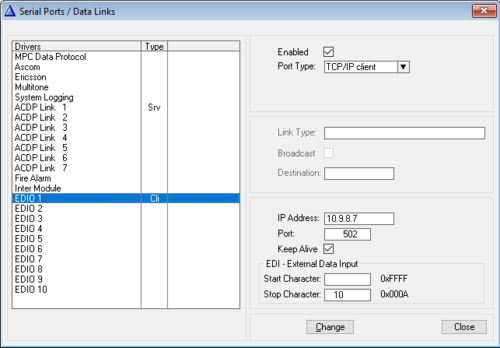Modbus TCP
From Zenitel Wiki
Introduction
Modbus TCP is a Modbus variant used for communications over TCP/IP networks, connecting over port 502. It does not require a checksum calculation as lower layers already provide checksum protection.
For background information on Modbus and its different variants please see the Modbus article in Wikipedia. Modbus is often used for data communication with PLC's.
AlphaCom and the Modbus TCP protocol
AlphaCom can send out status information in the Modbus TCP protocol via an EDO-port.
- In AlphaPro, Exchange & System > Serial Ports, select an available EDIO port, for instance EDIO 1
- Set Port Type = TCP/IP client
- Enter the IP address of the PLC to connect to
- Enter the Port number which is used by the Modbus TCP protocol, by default 502.
Modbus TCP protocol - AlphaPro programming
The exact meaning of databytes will depend on the specific installation and PLC used. This article gives an example of an implementation for a real installation, please modify as appropriate for the actual requirement. In this example the AlphaCom sends status information about each intercom station to a PLC, which uses this information for visualisation. The status is coded in a single byte, where each bit has a specific meaning.
- Bit #0: Intercom station is OK and ready for use
- Bit #1: Faulty line or faulty station
- Bit #2: Intercom station in conversation
In this example the information is written to specific registers in the PLC, 1 register for each intercom station. The PLC registers to use are from 50001 and up, related to the physical number 1 and up for the intercom stations.
Example: Station line error - Program an event:
- Owner Type: Station with UDP 8
- Event Type: 13 - Faulty station line
- When Change To: ON
- Action string: EDO 1 "\0\x01\0\0\0\x06\x02\x06%dfmt(%op(%1.phy,+,50000),X,4)\0\x02"
In this specific case the meaning of the bytes is:
- \0\x01 - Transaction Identifier; 2 bytes
- \0\0 - Protocol Identifier; 2 bytes; always '0' for Modbus TCP
- \0\x06 - Length Field; 2 bytes; Number of remaining bytes in this frame
- \x02 - Unit Identifier; 1 byte; Slave Address (255 if not used)
- \x06 - Function code; 1 byte; Function codes as in other variants - 6: Write single register
- %dfmt(%op(%1.dir,+,49900),X,4)\0\x02 - Data bytes; n bytes; Data as response or commands - In this specific example this is 4 bytes, 2 bytes to address the register and 2 bytes for the data to be written.
Notes: \x is the escape code to indicate that the following value is hexadecimal; 0 should be send as \0



